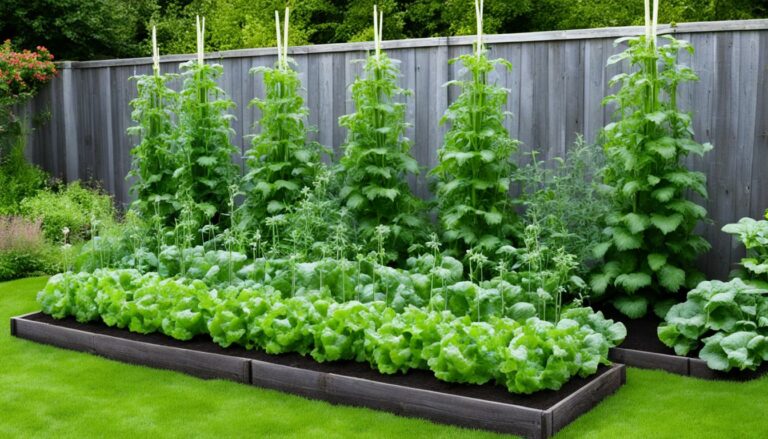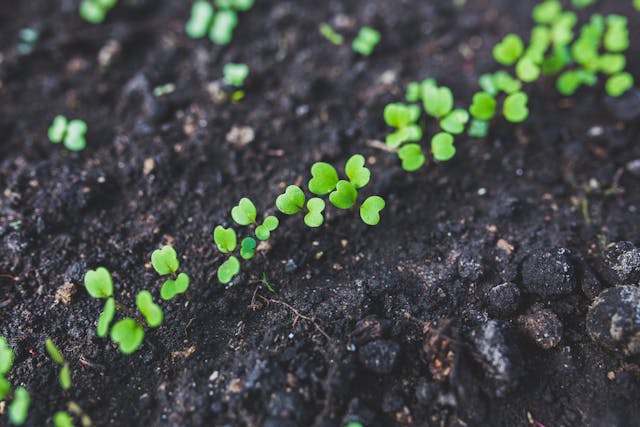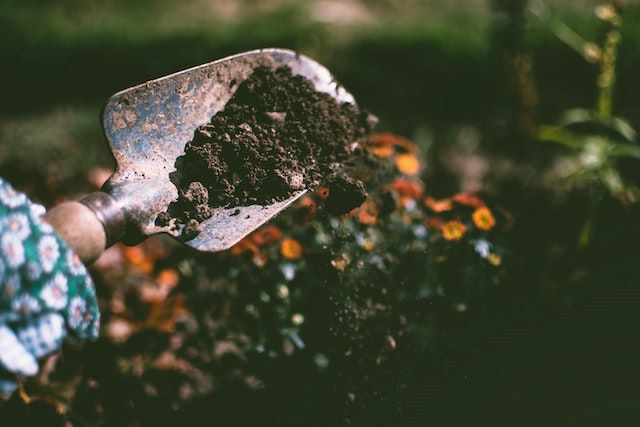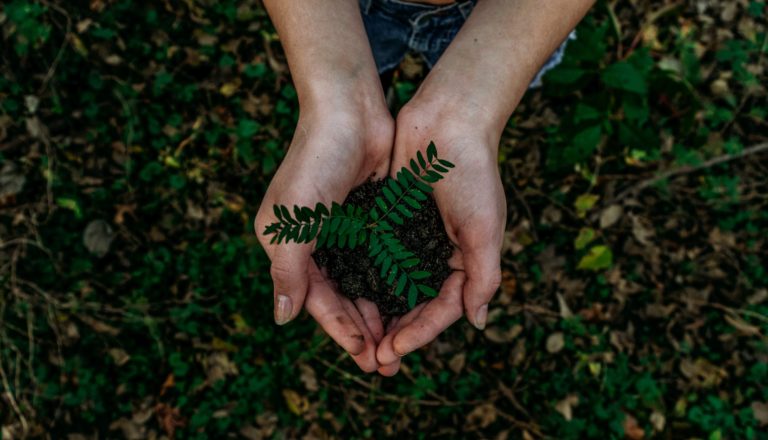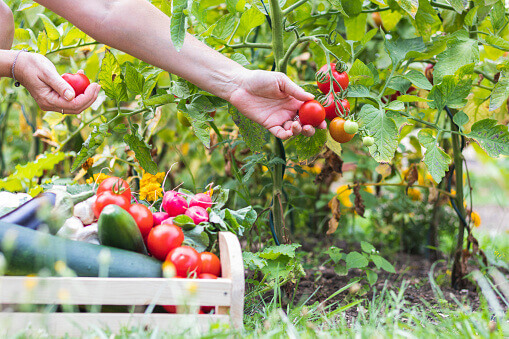Perlite vs Vermiculite in Your Veggie Garden
Perlite vs vermiculite: many, many people don’t know the difference between the two, nor how beneficial (and inexpensive) they are.
These are simply two soil amendments that can make all the difference in your garden’s success.
When it comes to creating the perfect environment for your beloved vegetables to thrive, perlite and vermiculite have become go-to options for gardeners.
Both lightweight soil additives offer unique benefits that can transform the health of your plants. So, how do you decide which one is right for your veggie garden?
What is Perlite?
Perlite is a lightweight, volcanic glass material that is used as a soil amendment in gardening. It is formed when obsidian contacts water, creating a unique type of volcanic glass with high water content. When heated, perlite expands into small white balls, which are then incorporated into potting soils to improve soil aeration and drainage.
Perlite is known for its ability to retain some water while also providing excellent air circulation in the soil. It is commonly used for plants that require the soil to dry out completely between watering and is also effective in reducing soil compaction.
| Perlite Properties | Benefits |
|---|---|
| Lightweight | Easy to handle and mix into soil |
| Improves soil aeration | Enhances oxygen flow to plant roots |
| Enhances soil drainage | Prevents waterlogged soil and root rot |
| Retains some water | Reduces the frequency of watering |
| Reduces soil compaction | Improves root penetration and nutrient uptake |
What is Vermiculite?
Vermiculite is a naturally occurring silicate material that expands when heated. It is made up of hydrated magnesium iron aluminum silicate minerals that form flaky flakes. When water is added to vermiculite, the flakes expand and act like a sponge, absorbing and holding moisture. This makes vermiculite an ideal soil amendment for plants that require consistent moisture, such as seedlings and moisture-loving plants. Vermiculite is effective in loosening heavy and compacted soils, improving water retention, and preventing soil compaction.
Vermiculite has unique properties that benefit plants and gardeners. Its ability to absorb and hold moisture allows it to provide a steady supply of water to the roots of moisture-loving plants. This is particularly useful in arid climates or during dry periods when regular watering may be challenging. Moreover, vermiculite’s ability to loosen heavy and compacted soils helps promote better root growth and nutrient absorption.
Vermiculite is also highly valued for its use in seed starting. Its moisture retention capabilities create an optimal environment for germination and early plant growth. The expanded flakes of vermiculite provide a light and airy medium that promotes healthy root development.
Additionally, vermiculite is often used in horticulture to enhance the soil’s ability to hold water. By increasing water retention, it reduces the frequency of watering required and helps plants survive in dry conditions.
Uses of Perlite and Vermiculite
Both perlite and vermiculite have various uses in gardening. Let’s explore the different ways you can incorporate them into your plant care routine!
Perlite Uses
Perlite is a versatile soil amendment that is commonly utilized in gardening. Here are some key uses of perlite:
- Seed Starting: Perlite is an excellent medium for starting seeds. It provides a lightweight and well-draining environment for germination, ensuring healthy root development.
- Potting Mixes: Perlite is often added to potting mixes to improve aeration and drainage. Its porous structure allows excess water to drain away, preventing waterlogged roots.
- Soil Conditioner: When incorporated into garden soil, perlite helps loosen compacted soil, improving its structure and facilitating root growth. It reduces soil compaction, allowing plant roots to penetrate easily.
- Hydroponic Gardening: Perlite is commonly used as a soilless growing medium in hydroponic gardening systems. Its lightweight nature and excellent drainage properties make it an ideal choice for supporting plant growth without the need for soil.
Vermiculite Uses
Sometimes the soil we have needs a little bit of help to make it the best and most suitable for growing food plants. Vermiculite is another valuable soil amendment with its unique properties. Here are some common uses of vermiculite:
- Seed Starting: Vermiculite is highly effective for starting seeds due to its ability to retain moisture. It creates an optimal environment for germination and seedling development.
- Potting Mixes: When added to potting soils, vermiculite improves water retention, keeping the soil consistently moist. This is particularly beneficial for plants that require constant moisture, such as ferns and certain tropical plants.
- Soil Amendment: Vermiculite can be added to garden soil to improve its water-holding capacity. It helps retain moisture, ensuring plants have a steady supply of water even in dry conditions.
- Hydroponic Gardening: Similar to perlite, vermiculite is also widely used as a lightweight growing medium in hydroponic systems. Its ability to hold moisture makes it suitable for supporting plant roots in soilless environments.
As you can see, both perlite and vermiculite offer unique benefits in different gardening applications. Whether you’re starting seeds, potting plants, conditioning soil, or exploring hydroponic gardening, these versatile soil amendments can support healthy plant growth.
To visualize the uses of perlite and vermiculite, take a look at the table below:
| Perlite Uses | Vermiculite Uses |
|---|---|
| Seed starting | Seed starting |
| Potting mixes | Potting mixes |
| Soil conditioner | Soil amendment |
| Hydroponic gardening | Hydroponic gardening |
Remember to choose the right soil amendment based on your specific gardening needs. Whether you opt for perlite or vermiculite, these natural additives can help you create optimal growing conditions for your plants!
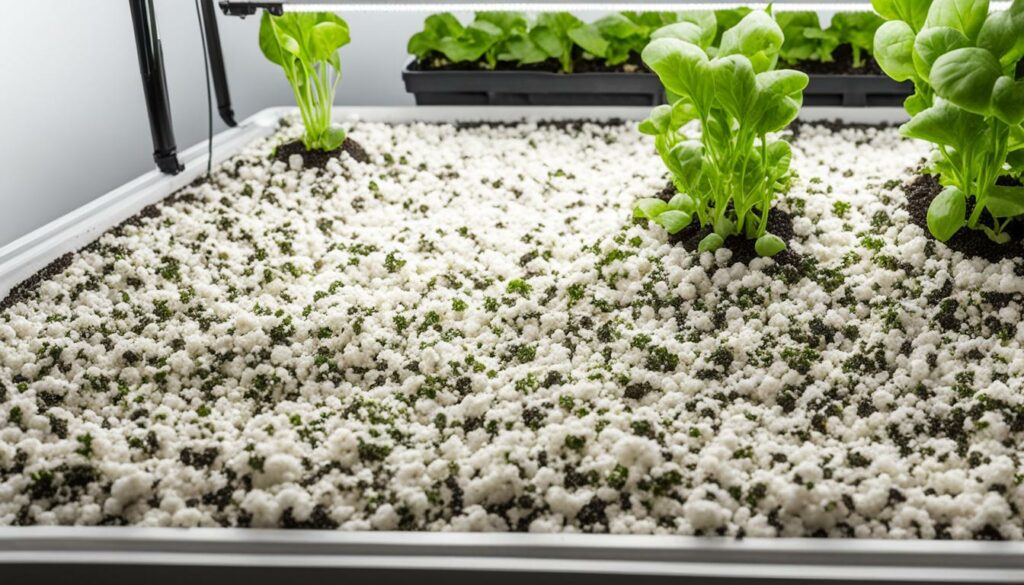
Pros and Cons of Perlite and Vermiculite
Perlite and vermiculite offer distinct advantages and disadvantages as soil amendments in gardening. Understanding their pros and cons can help you make an informed decision when choosing between the two.
Perlite Advantages:
- Improves soil aeration and drainage
- Reduces soil compaction
- Lightweight and easy to handle
- Retains some water while providing excellent air circulation
Perlite Disadvantages:
- No nutritional benefits for plants
- Non-renewable mined material
- Can blow away or float in water if not properly managed
Vermiculite Advantages:
- Excellent water retention
- Ideal for plants that require constant moisture
- Improves seed germination
- Helps anchor young root systems
Vermiculite Disadvantages:
- No nutritional benefits for plants
- Non-renewable material
- Quality may vary and may contain impurities if not sourced from reputable suppliers
“Perlite improves soil aeration and drainage, while vermiculite excels in water retention.”
Perlite’s lightweight nature and ability to improve soil aeration and drainage make it a popular choice for gardeners. It helps reduce soil compaction and allows for better root development. However, it does not provide any nutritional benefits for plants and is a non-renewable mined material. Care must be taken to prevent perlite from blowing away or floating in water.
Vermiculite’s water retention properties make it ideal for plants that require constant moisture. It aids in seed germination and provides support for young root systems. However, vermiculite also lacks nutritional benefits for plants and is a non-renewable material. It is important to source vermiculite from reputable suppliers to ensure its quality and avoid potential impurities.
How to Choose: Perlite vs Vermiculite
Choosing between perlite and vermiculite depends on your specific gardening needs. It’s important to consider the watering needs of your garden soil and the drainage requirements of your plants to make an informed decision.
Watering Needs
If you have plants that require the soil to dry out completely between watering, perlite is a better choice. Perlite promotes excellent drainage and aeration, allowing excess water to flow through and preventing waterlogged soil that can lead to root rot.
On the other hand, if you have plants that require constant moisture, such as seedlings or moisture-loving plants, vermiculite is the way to go. Vermiculite retains moisture well and provides good water holding capacity, ensuring that the soil remains consistently moist.
Drainage Requirements
Consider the drainage requirements of your plants when choosing between perlite and vermiculite. Some plants, like cacti and succulents, prefer well-draining soil with minimal moisture retention. In this case, perlite would be the more suitable choice due to its excellent drainage properties.
However, for plants that thrive in consistently moist soil or have shallow root systems, like certain vegetables or flowers, vermiculite is a better option. Its water retention abilities help keep the soil evenly moist, preventing it from drying out too quickly.
Aeration Needs
Aeration is crucial for root health and optimal plant growth. If your plants require good air circulation in the root zone, perlite is the ideal choice. Its lightweight and porous nature allow for proper aeration, preventing the soil from becoming compacted and ensuring that roots have access to oxygen.
On the other hand, if your plants don’t have high aeration needs, such as those that prefer consistently moist conditions, vermiculite can provide adequate oxygen flow to the roots while retaining moisture.
Overall, choosing between perlite and vermiculite involves considering the watering needs, drainage requirements, and aeration needs of your plants. By taking these factors into account along with your climate conditions, you can select the most suitable soil amendment for your garden.
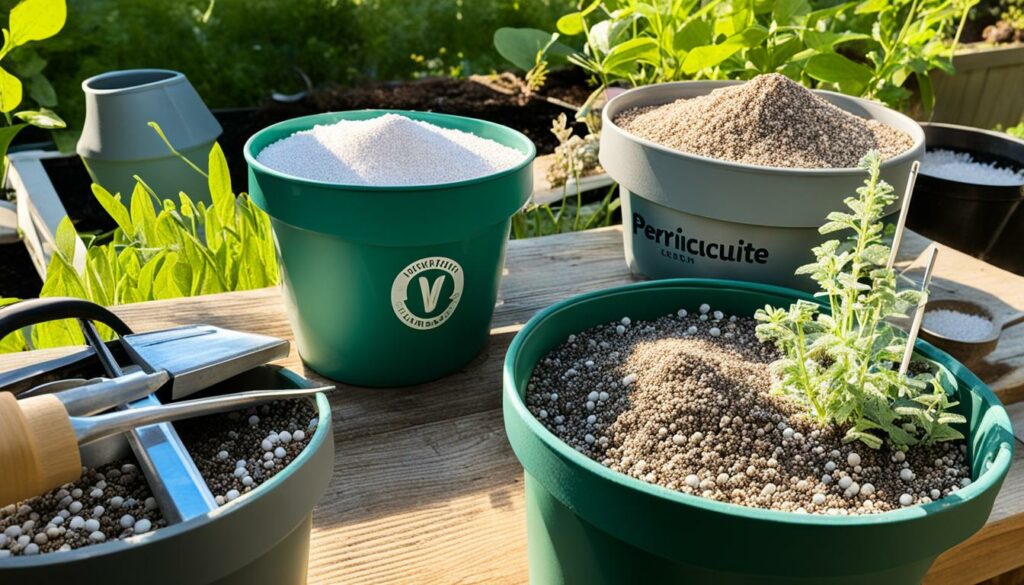
Conclusion
In conclusion, perlite and vermiculite are two valuable soil amendments that can greatly benefit your gardening efforts. These materials have distinctive characteristics when it comes to moisture retention and drainage properties, making them suitable for different types of plants.
Perlite is an excellent choice for plants that require well-drained soil and periodic drying out between watering. Its lightweight nature promotes optimal aeration and prevents soil compaction, ensuring healthier root development. On the other hand, vermiculite shines when it comes to moisture-loving plants that need constant hydration. It effectively retains water and prevents soil from drying out too quickly, providing the ideal environment for their growth.
By understanding the differences between perlite and vermiculite, you can make an informed decision on which soil amendment to use in your garden. Consider your plants’ specific watering needs, drainage requirements, and overall aeration needs. This will enable you to create the optimal soil conditions for their growth and ultimately promote healthy plant growth and abundant harvests.
Whether you choose perlite or vermiculite, incorporating these soil amendments into your gardening routine can greatly enhance the quality of your soil and maximize the potential of your plants. So, go ahead and experiment with these versatile additions to create the perfect environment for your veggie garden!
FAQ
What is perlite and how is it used in gardening?
Perlite is a lightweight, volcanic glass material that is used as a soil amendment in gardening. It improves soil aeration and drainage, making it ideal for seed starting mixes, potting soils, and as a soil conditioner. It can also be used in hydroponic gardening systems as a lightweight soilless medium for plant root development.
What is vermiculite and how is it used in gardening?
Vermiculite is a naturally occurring silicate material that expands when heated. It is used in gardening to improve water retention, loosen heavy and compacted soils, and prevent soil compaction. Like perlite, it is commonly used in seed starting mixes, potting soils, and as a soil amendment.
What are the benefits of using perlite in gardening?
Perlite improves soil aeration, drainage, and reduces soil compaction. It is lightweight, easy to handle, retains some water while providing excellent air circulation, and is effective for plants that require the soil to dry out completely between watering.
What are the benefits of using vermiculite in gardening?
Vermiculite excels in water retention, making it ideal for plants that require constant moisture. It also improves seed germination and helps anchor young root systems. Additionally, it is effective in loosening heavy and compacted soils.
What are the uses of perlite and vermiculite in gardening?
Perlite and vermiculite can be used in seed starting mixes, potting soils, and as soil conditioners. They are commonly used in gardening to improve soil aeration, drainage, water retention, and prevent soil compaction. They are also used in hydroponic gardening systems as lightweight soilless media for plant root development.
What are the advantages and disadvantages of perlite in gardening?
The advantages of using perlite include improved soil aeration, drainage, and reduced soil compaction. However, it has no nutritional benefits for plants, is a non-renewable mined material, and can blow away or float in water if not properly managed.
What are the advantages and disadvantages of vermiculite in gardening?
The advantages of using vermiculite include improved water retention, seed germination, and prevention of soil compaction. However, it provides no nutritional benefits, is a non-renewable material, and may contain impurities if not sourced from reputable suppliers.
How do I choose between perlite and vermiculite for my garden?
The choice between perlite and vermiculite depends on the watering needs of your garden soil and the drainage requirements of your plants. If your plants require the soil to dry out completely between watering, perlite is the better choice. If your plants require constant moisture, such as seedlings or moisture-loving plants, vermiculite is the ideal option.

